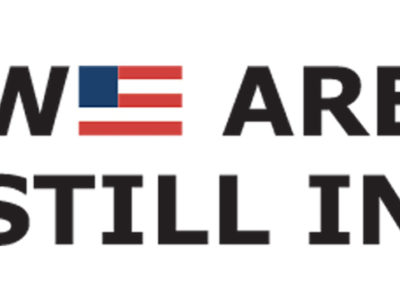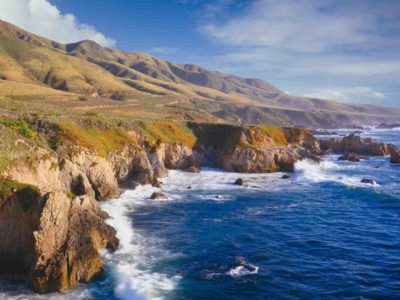Nov. 2018: Senate Races
The odds are that the Republicans will continue to control the Senate in 2018. The electoral map is very unfavorable to the Democrats, with many vulnerable Democrats up for reelection and only two such Republicans. But even if the GOP keeps control, their victory margin matters. It will determine how much maneuvering room that McConnell has to work with (currently only a single vote). The margin will also set the stage for the 2020 elections, when the Democrats face a mo...
CONTINUE READINGThe Return of Federal Common Law
Will the federal courts take over control of climate change litigation? One judge says so.
I’m traveling but wanted to get in a few quick words about Judge Alsup’s decision today in the California climate change litigation. This is a really complex issue, and I wanted to try to unpack it a bit. In general, except where a federal statute or constitutional provision is the basis for an action, legal disputes are governed by state law, whether cases are filed in state court or federal court. There is an exception, however, for matters of special federal co...
CONTINUE READINGProgress on California water data
Michael Kiparsky and Alida Cantor
Water data has become quite a hot topic in California, and rightly so: throughout the state, decision-makers desperately need better information to guide their efforts to better manage this resource. Recent legislation has gotten us to the starting line, but how well new data platforms ultimately serve water management will depend on clear thinking and bold action during implementation. Fortunately, there has been quite a range of recent activity on water data, including...
CONTINUE READINGPrivatizing Paris
With the U.S. faltering, it’s time for corporations to begin a collaborative effort to cut emissions.
Many major corporations bemoaned Trump’s withdrawal from the Paris Agreement and pledged to continue their own environmental efforts. Why stop with acting solo? Why not band together? There’s power in joint action. Here are four options, from simplest to most ambitious. Taking the Paris Agreement Private. Under the Paris Agreement, nations agree to engage in certain types of monitoring to implement emissions cuts that they set themselves. Companies have to moni...
CONTINUE READINGEnsuring Public Access to California Waterways–In Plain Language
New California State Lands Commission Public Access Guide Required Reading for Coastal Enthusiasts
California residents are passionate about their coastal and inland waterways--and especially their ability to access and enjoy these natural resources. It was concern over being "walled off from the coast" by private development that prompted California voters in 1972 to approve an initiative measure that created the California Coastal Commission and led to California's Coastal Act--the strongest coastal planning and regulatory statute in the nation. Indeed, publ...
CONTINUE READINGGuest Blogger Ken Alex: Resilience and Adaptation
Post #7 in a Series on California Climate Policy by Ken Alex, Senior Policy Advisor to Gov. Jerry Brown
[This is the seventh post in a series expressing my view of why California’s actions on climate change are so important and how they will change the world. The introductory post provides an overview and some general context.] Climate change has arrived. Our fire season never ends; we no longer know if we will have a rainy season or how much rain is now normal; our beaches are eroding; temperatures are rising; fog and wind patterns are changing. More is on the ...
CONTINUE READINGPublic Lands Watch: BLM Methane Rule (Again)
BLM proposes repeal of rule restricting methane emissions from oil and gas development on federal lands
Tom Schumann drafted this blog post. As previously announced, the Interior Department has published its proposal to roll back an Obama-era regulation aimed at reducing climate change-causing methane releases from oil and gas operations on federal lands. The Obama-era regulation—commonly known as the methane rule—would (1) limit the amount of methane produced by wells that could be flared and vented; (2) impose measures to prevent leakage during transportation and ...
CONTINUE READINGThe Carbon Tax — More Attractive Than Ever
Due to the latest tax bill, a carbon tax look like a great strategy when the Dems take power again.
Sooner or later, the Democrats will take control of Congress and the White House, just like the Republicans right now. That's not a political prediction so much as a recognition that the wheel is bound to turn around at some point. At that point, they should give very serious consideration to the possibility of a carbon tax. Recent experience with the GOP's massive tax cut has made the carbon tax more appealing for three reasons: (1) the government will need extra re...
CONTINUE READINGThe Social Cost of Carbon – Revisited
The case for using global rather than simply U.S. impacts.
The estimated harm done by a single ton of carbon in the atmosphere – the “social cost of carbon” -- is a key factor in setting climate policy. The Trump Administration is trying to get its estimate as close to zero as possible. A key part of this effort is to exclude from consideration the impacts of climate change outside the United States. It seems unlikely that courts will impose a mandatory duty on EPA to consider these global impacts. But EPA does have discre...
CONTINUE READINGSurveying the Landscape of Local Zoning and CEQA
First report from Berkeley/Columbia research project shows how Bay Area residential developments negotiate land-use and CEQA review
A group of interdisciplinary researchers from law and planning (which I am part of) just released its first report on how CEQA and land-use law shape the process of regulating and approving residential developments in five Bay Area cities. (I first posted about our research here.) I’ve included the Executive Summary below, and the full report can be accessed here. Our research is ongoing, as we are covering a significant number of additional cities throughout Cal...
CONTINUE READING








